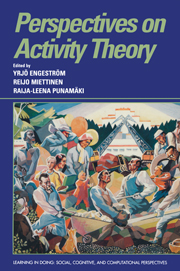Book contents
- Frontmatter
- Contents
- List of contributors
- Series foreword
- Introduction
- Part I Theoretical issues
- 1 Activity theory and individual and social transformation
- 2 The content and unsolved problems of activity theory
- 3 Knowledge as shared procedures
- 4 Activity theory in a new era
- 5 Society versus context in individual development: Does theory make a difference?
- 6 Cultural psychology: Some general principles and a concrete example
- 7 Laws, logics, and human activity
- 8 Collapse, creation, and continuity in Europe: How do people change?
- 9 Activity theory and the concept of integrative levels
- 10 The relevance to psychology of Antonio Gramsci's ideas on activity and common sense
- Part II Language and its acquisition
- Part III Play, learning, and instruction
- Part IV Technology and work
- Part V Therapy and addiction
- Author index
- Subject index
3 - Knowledge as shared procedures
Published online by Cambridge University Press: 05 June 2012
- Frontmatter
- Contents
- List of contributors
- Series foreword
- Introduction
- Part I Theoretical issues
- 1 Activity theory and individual and social transformation
- 2 The content and unsolved problems of activity theory
- 3 Knowledge as shared procedures
- 4 Activity theory in a new era
- 5 Society versus context in individual development: Does theory make a difference?
- 6 Cultural psychology: Some general principles and a concrete example
- 7 Laws, logics, and human activity
- 8 Collapse, creation, and continuity in Europe: How do people change?
- 9 Activity theory and the concept of integrative levels
- 10 The relevance to psychology of Antonio Gramsci's ideas on activity and common sense
- Part II Language and its acquisition
- Part III Play, learning, and instruction
- Part IV Technology and work
- Part V Therapy and addiction
- Author index
- Subject index
Summary
Introduction
Most of the chapters in this volume are concerned with applying activity theory to different aspects of individual development and social transformation. From that point of view, the subject of this chapter (the relevance of L. S. Vygotsky's ideas to the philosophical theory of knowledge) may be peripheral. Still, something is gained if, for once, we stand back and view activity theory itself against its larger background in intellectual history. The questions to be raised here, then, have to do with the history of Western epistemology, and with the ways in which the work of Vygotsky and his successors helps throw light on current problems in this area.
To explain my personal interest in this subject: I have admired the work of Vygotsky and A. R. Luria for more than 20 years, having come to their writings through the American clinical neuroanatomist Norman Geschwind (1974). Geschwind's work on the aphasias and apraxias was closely related to the neurological work that Luria did during and after World War II. As Geschwind saw it, Luria's approach opened a new direction of attack on the cerebral localization of higher mental functions, and so on our whole understanding of sensory and cognitive systems (Luria, 1973). But that is not all: Going beyond neurology and psychology (he thought), Luria also suggested new ways of resolving other larger, more long-standings issues in the tradition of Western epistemology.
Information
- Type
- Chapter
- Information
- Perspectives on Activity Theory , pp. 53 - 64Publisher: Cambridge University PressPrint publication year: 1999
Accessibility standard: Unknown
Why this information is here
This section outlines the accessibility features of this content - including support for screen readers, full keyboard navigation and high-contrast display options. This may not be relevant for you.Accessibility Information
- 36
- Cited by
